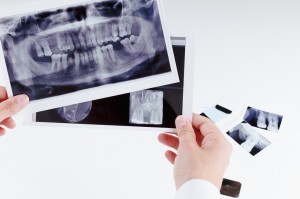Some dental emergencies are more obvious than others: bleeding from the mouth, a tooth that got knocked out, or a toothache severe enough to make you want to pull it out yourself (best leave that to us!). Some situations are less clear cut: when should you wait for an appointment, and when do you need to immediate attention? Let’s take a look at some situations below.
Dental emergencies are classified as any problem associated with tissue bleeding (bleeding of the gums or the lining of the mouth), severe pain, blows to the face, swelling of the mouth or any breakage of the teeth or jaws. If you are experiencing any of these symptoms, call your dentist immediately. If it’s during normal work hours, most dental offices will have open slots for the sole purpose of handling emergencies. Additionally, most dental offices also have an emergency number you can call after hours or when the office is otherwise closed. If the situation warrants it, you will be connected to a specialist who can meet you at an office for an emergency procedure. If the situation is milder, you will get instructions for how to control the situation until you can see a dentist or specialist during normal hours.
It’s particularly important to see a dentist immediately if you have a knocked out (avulsed) tooth, or even if the tooth is only particularly removed or misaligned. Time is of the essence here: if you are able to see a dentist within 1 hour of the accident, there is a good chance that your original tooth can be replaced. Any later and it may be too late to save the tooth, and you will likely need an implant. You can read more about the situation here but remember: time is of the essence in this situation, and you must act quickly and be careful with the original tooth.
Chipped teeth usually aren’t an emergency because they usually occur at the top of the teeth rather than where they can affect the sensitive roots or the pulp chamber. A chipped tooth can wait for a regular appointment, though if the chipped edge is sharp try applying over-the-counter dental cement to the area until you can be seen.
Cracked or fractured teeth are a different story: these are often emergencies because they can penetrate into the pulp chamber. This will often be outright painful, or you may notice sudden sharp pain when drinking or eating something hot or cold. If the crack or fracture has penetrated into the pulp chamber, it may become quickly infected as well. In most cases, a root canal will be needed, and a crown installed later on. If your tooth has cracked or fractured, see a dentist immediately and in the meantime, do your best not to bite down on the tooth so as to not exacerbate the problem further.
Dental emergencies not just limited to teeth. Gums are a vital part of the mouth and injuries to the cheeks, gums, or other oral tissues, such as a puncture wound, facial strike, or severe tears or cuts should be tended to immediately, To control blood loss and encourage clotting in the meantime, try applying a moist tea bag or small wads of gauze to the affected area.
Abscesses are another concern that should be addressed immediately. The roots of teeth can become injured or infected for various reasons, which can also spread to the surrounding gums. This is a particular problem with wisdom teeth, which are prone to rupturing and causing accesses and infection. If left untended even for a short while, the infection can spread to other areas of the body — in severe cases, this can even be life-threatening. Abscesses and infections can cause severe pain and even fever. Be sure to call your dentist as soon as symptoms start developing so you can stave off a larger problem!
So, what other kinds of things are annoyances but not necessarily emergencies? Broken braces wires and missing crowns or fillings should be tended to at the next available appointment, but they’re not usually emergencies unless they have caused pain or bleeding. A broken wire can be capped with a little bit of wax and pushed out of the way until it can be mended while missing crowns and fillings should be kept and the hole plugged with over-the-counter dental cement, or even a piece of sugarless gum until you can make an appointment. Just be careful not to bite on the tooth if you can help it, as it’s fragile and can break under pressure: a real dental emergency you’ll want to prevent!
Not all dental emergencies can be avoided — nobody asked to be hit in the face with a ball! But routine checkups keep teeth healthy and help prevent the formation of infections, accesses, loose teeth and other problems. It’s also important to do your part by brushing and flossing every day, which will keep your teeth and gums strong and resilient. When in doubt, give your dental office a call for more information if your situation arises and you’re not sure if it’s an emergency. Better safe than sorry!








Leave a Reply